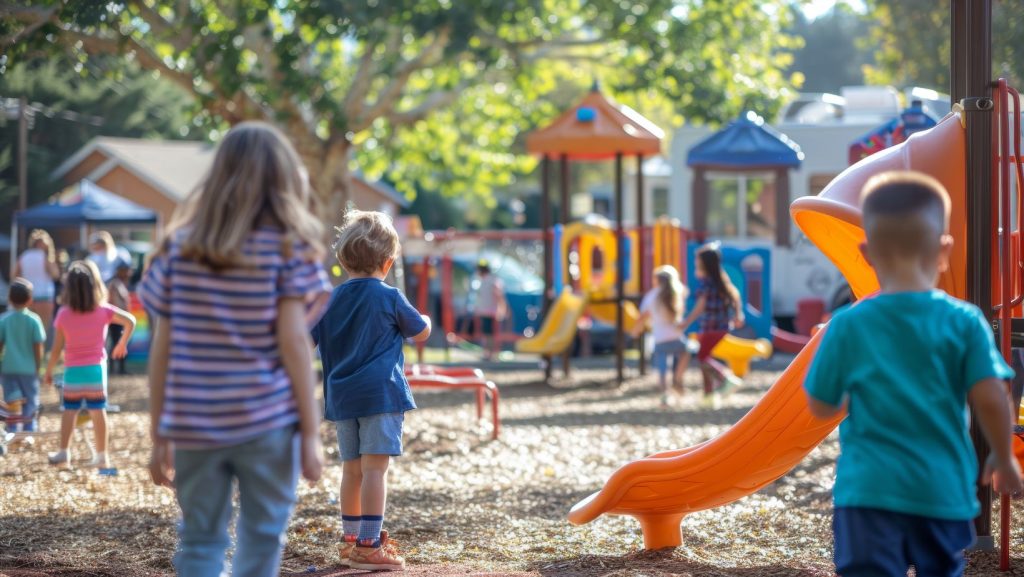
Childhood is filled with moments of learning, growth, and discovery—and while classroom lessons are important, recess plays a vital role in shaping a child’s overall development. Often seen as a “break” from structured learning, recess is actually an essential opportunity for kids to recharge, explore, and develop crucial (there’s a better word for this!) skills like collaboration, problem-solving, and creativity.
This post dives into why recess matters, its many benefits, and how outdoor play and school playgrounds contribute to a child’s growth. Plus, you’ll find actionable tips to make recess even more impactful.
Why Recess Matters for Kids
Recess isn’t just free time—it’s a reset button that helps kids thrive both physically and emotionally. After hours of structured, focused learning, recess offers children the chance to recharge their energy and refocus for the remainder of the day.
During recess, children engage in unstructured play, which allows them to express themselves freely without the constraints of rules or grades. Psychologists argue that this kind of play promotes emotional well-being, helping kids handle stress and frustration in healthier ways.
From a development standpoint, recess is more than just fun. It’s a critical component of child development. Kids learn to interact with peers, resolve conflicts, and build friendships—all of which are foundational social skills for life.
The Benefits of Recess
Recess delivers a wide range of benefits that extend far beyond the playground. Here’s a closer look at why outdoor play is essential for growing minds and bodies.
Physical Health and Motor Skills
Recess offers kids a daily opportunity for physical activity that strengthens their muscles, improves motor skills, and promotes overall health. Activities like running, jumping, and climbing not only help keep children fit but also enhance their coordination and balance. Through active play, kids develop essential physical abilities while staying healthy and energized.
Social Benefits
Interaction during recess plays a crucial role in helping children develop essential social skills such as communication, cooperation, and conflict resolution. Activities like group games and playground interactions teach the importance of teamwork, taking turns, sharing, and listening to others, fostering a sense of collaboration and mutual respect.
Outdoor play with peers also naturally builds empathy and problem-solving abilities as children navigate challenges and learn to understand different perspectives. Through these experiences, recess becomes more than just a break—it’s a valuable opportunity for children to grow socially and emotionally.
Creativity and Independent Thinking
The imaginative play that naturally unfolds during recess and on playgrounds fosters creativity and encourages kids to think outside the box. Whether they’re pretending to be explorers on a climbing frame, inventing games with friends, or engaging in free play during recess, children develop important skills through these activities.
Recess and playground time help them learn to adapt, innovate, and solve problems independently, all while having fun and building social connections with their peers.
Emotional Well-Being
Recess offers kids a much-needed mental break, helping them manage stress, release excess energy, and return to the classroom feeling refreshed and ready to learn. This downtime is essential for recharging their minds and bodies, ensuring they’re prepared to focus and engage.
Additionally, unstructured play or free play during recess has a significant positive impact on children’s mood and emotional resilience. This free time allows them to explore, interact, and express themselves, fostering emotional well-being and better equipping them to handle challenges throughout the day.
The Role of School Playgrounds in Child Development
School playgrounds are more than just spaces for fun—they’re essential environments that support physical, social, and cognitive development.
An effective school playground offers a mix of equipment and areas that cater to different play styles and preferences. These spaces should include opportunities for active play, like climbing walls and monkey bars, alongside quieter spots for games or imaginative activities.
Well-designed school playgrounds also promote inclusivity by providing options for kids of all abilities. Features like wheelchair-accessible pathways and sensory-friendly zones can offer every child an enriching recess experience.
Outdoor play doesn’t always require fancy equipment. Natural elements like grassy areas, logs to climb on, or small gardens can add variety and spark creativity. These additions ensure that recess stays engaging and provides a foundation for learning outside the classroom.
Tips for Improving Recess Time
Want to make recess an even more enriching experience for children? Here are some actionable ideas to get started.
Advocate for Balanced Recess Periods
- Encourage schools to dedicate sufficient time for recess, as shorter breaks often fail to provide real benefits.
- Work with educators and parents to ensure recess remains a priority in the school schedule.
Offer a Variety of Activities
- Include a mix of activities that cater to all interests, from group games like soccer to individual pursuits like drawing or reading in quiet areas.
- Organize occasional themed recess days, like obstacle courses or scavenger hunts, to keep things exciting.
Design Inclusive School Playgrounds
- Ensure playgrounds accommodate kids of all abilities by incorporating inclusive play equipment, accessible pathways, and sensory-friendly spaces.
- Add natural elements like trees, shaded areas, or sandbox zones for more variety.
Upgrade Your Playground for Better Outdoor Play
- Ensure your playground is in good shape and equipped with effective, engaging equipment. Adding modern, safe, and age-appropriate play structures can enhance outdoor activities and maximize the benefits of recess for kids.
Play is Learning—Prioritize Recess!
Recess isn’t just a “break” from the school day—it’s an essential part of a child’s growth. Outdoor play and well-designed school playgrounds foster physical health, social skills, creativity, and emotional well-being in ways that can’t be replicated in the classroom.
By giving kids access to diverse and engaging play experiences, we’re not just helping them grow—we’re equipping them with the lifelong skills needed to succeed.
Investing in better recess opportunities starts with better playgrounds. Contact SPI Plastics today to learn how we can help upgrade your school playground to create a space where every child can feel included and inspired.